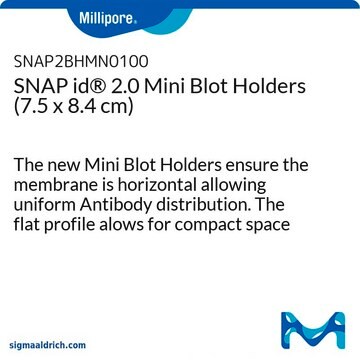SNAP2MB1
SNAP id® 2.0 Protein Detection System
Mini and MultiBlot
Synonym(s):
Protein detection system
About This Item
Recommended Products
product name
SNAP i.d. 2.0 Protein Detection System-Mini and MultiBlot (7.5 x 8.4 cm and 4.5 x 8.4 cm), Developed to meet the needs of our Western blotting customers, the SNAP i.d. 2.0 system produces blots of a very high quality. Unique vacuum-driven technology & a built-in flow distributor actively drive reagents through the membrane.
manufacturer/tradename
SNAP id®
technique(s)
western blot: suitable
compatibility
for use with Commercially available blocking reagents
for use with Luminata Western HRP Substrates
for use with Nitrocellulose
for use with PVDF (Immobilon membranes)
for use with blØk<TMSYMBOL></TMSYMBOL>-CH Buffer (cat. no. WBAVDCH01)
for use with blØk<TMSYMBOL></TMSYMBOL>-FL Buffer (cat. no. WBAVDFL01)
for use with blØk<TMSYMBOL></TMSYMBOL>-PO Buffer (cat. no. WBAVDP001)
for use with commercially available detection reagents
detection method
chemiluminescent
colorimetric
fluorometric
shipped in
ambient
storage temp.
room temp
General description
Application
Linkage
Legal Information
Disclaimer
Certificates of Analysis (COA)
Search for Certificates of Analysis (COA) by entering the products Lot/Batch Number. Lot and Batch Numbers can be found on a product’s label following the words ‘Lot’ or ‘Batch’.
Already Own This Product?
Find documentation for the products that you have recently purchased in the Document Library.
Customers Also Viewed
Articles
The possible causes and potential remedies for challenges encountered as a result of blocking, washing, antibody incubation, and detection/exposure of Western blots
Protocols
The SNAP i.d. 2.0 Protein Detection System is the second generation of the SNAP i.d. method for detecting immunoreactive proteins on Western blots.
Western blot protocol details protein transfer from gels to nitrocellulose, crucial for immunoblotting procedures in research.
Western blot protocol details protein transfer from gels to nitrocellulose, crucial for immunoblotting procedures in research.
Western blot protocol details protein transfer from gels to nitrocellulose, crucial for immunoblotting procedures in research.
Our team of scientists has experience in all areas of research including Life Science, Material Science, Chemical Synthesis, Chromatography, Analytical and many others.
Contact Technical Service









